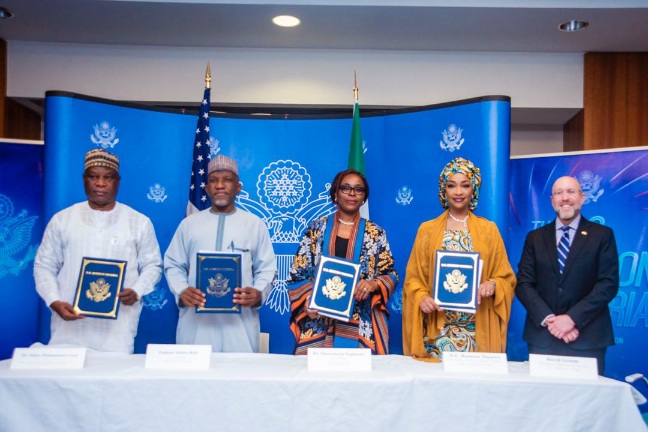Minister of Art, Culture and the Creative Economy, Hannatu Musa Musawa, has expressed her profound gratitude to the United States Embassy in Nigeria and the U.S. Ambassadors Fund for Cultural Preservation (AFCP) for their unwavering support in preserving Nigeria’s cultural heritage.
The Minister stated this while signing a Memorandum of Understanding (MoU) for the Conservation of the Tangible and Intangible Heritage of Sukur Cultural Landscape project on Thursday at the US Embassy in Abuja.
Highlighting the long-standing partnership between Nigeria and the United States of America in cultural preservation, Minister Musawa mentioned several collaborations, including the Cultural Property Agreement Implementation Grants (CPAIG) Program, the Cultural Property Implementation Act (CPIA) Agreement and the upcoming training program for Nigerian stakeholders on the illicit export of antiquities.
According to her, “Remarkably, the USA has consistently supported cultural projects in Nigeria. One of the means through which the United States deploys its support for culture, is the veritable Ambassadors Fund for Cultural Preservation.
“It is worthwhile to state that the USA has graciously and bountifully extended its friendship towards Nigeria through this Fund.”
According to a statement issued by Nneka Ikem Anibeze, SA Media and Publicity to the Minister which was made available to Journalists, the Minister emphasised the significance of the Sukur Cultural Landscape, a UNESCO World Heritage site in Adamawa currently facing insurgency and climate change threats.
The AFCP grant of $1.5 million will support a two-year project led by ICOMOS Nigeria, in collaboration with the National Commission for Museums and Monuments (NCMM), American University of Nigeria (AUN), and Ahmadu Bello University (ABU).
The project aims to, among other things, conserve the tangible and intangible heritage of Sukur, and enhance community capacity and resilience.
It is also targeted at strengthening local, national, and international networks for site conservation and aims to revitalise threatened traditional crafts and the Sakun language.
Minister Musawa also announced the successful implementation of the CPIA Bi-lateral Agreement, which has significantly deterred illegal exports of Nigerian antiquities.
A training program for stakeholders in customs, immigration, and other relevant agencies is scheduled to strengthen this collaboration further.
She reiterated Nigeria’s appreciation for the U.S. government’s commitment to cultural preservation and expressed her confidence in the success of the Sukur project.
Responding, H.E David Greene, the Chargé d’Affaires and Acting United States Ambassador in Nigeria highlighted the gains in the long-standing relationship between Nigeria and America and the desire to consolidate the achievements with the current minister.
According to him, “Building on twenty years of AFCP grants in 2021, the United States and Nigeria signed the bilateral Cultural Property Agreement. With that, we intensified joint efforts to identify, intercept, and repatriate looted, or other displaced cultural property and related heritage works.
“These efforts paved the way for the official transfer in October 2022 of twenty-two Benin Bronzes back to Nigeria. I am pleased to report that since 2022, the number has grown, and now a total of sixty-three Benin Bronzes have been successfully repatriated to Nigeria”.
David Green then assured that the latest AFCP grant will support ICOMOS-Nigeria and its local partners to help preserve Sukur cultural heritage through infrastructure enhancements, revival of threatened traditional crafts, and documentation and preservation of the Sakun language.
He however noted that this will require a collaborative effort amongst each of the partnering organizations.
“We truly appreciate your unwavering dedication to conserve, protect, and preserve Nigeria’s cultural heritage,” he concluded.
Other partners who signed the MoU are Dr Salisu Mohamned Lawal of the Centre for Inclusive and Accountable Governance; Atiku Institute for Development; American University of Nigeria; Professor Kabiru Bala, Vice Chancellor, Ahmadu Bello University; Dr. Oluwatoyin Sogbesan, President International Council on Monuments and Sites (ICOMOS).
